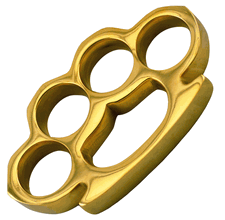And that got me thinking about the laws in California. Intuition says that building a cannon can't be legal, but I wasn't sure which specific law(s) a homemade cannon would violate. Turns out, building a cannon in California potentially violates several laws. There is a narrow path through this legal minefield, though. If you follow a few key rules, you might not get arrested. If you do get arrested, you might have a valid defense. Maybe.
The first law you need be aware of is PC 18710. That section specifically addresses "destructive devices". The definition of a "destructive device" in California includes any cannon that shoots fixed ammunition. It also prohibits explosive or incendiary ammunition. Howitzers, mortars and modern artillery are illegal, but this definition does not seem to include traditional "cannons" loaded with black powder, as long as they do not fire prefabricated ammo (casing, primer and projectile in one "shell").
If your cannon uses black powder rather than "fixed ammunition", then it is not a "destructive device". You're not out of the woods, though. If your device fires any projectile (a golf ball, a potato, a can of soup, etc.), it may fall within the legal definition of a "zip gun". A zip gun is defined in PC 17360 as any device that was not produced by a licensed firearms dealer and which expels a projectile by the force of an explosion. Possession of a zip gun is completely prohibited and may be punishable by up to 3 years in prison.
So that leaves 2 options for Californians who want to build a cannon, but who also want to stay on the happy side of the law:
The first law you need be aware of is PC 18710. That section specifically addresses "destructive devices". The definition of a "destructive device" in California includes any cannon that shoots fixed ammunition. It also prohibits explosive or incendiary ammunition. Howitzers, mortars and modern artillery are illegal, but this definition does not seem to include traditional "cannons" loaded with black powder, as long as they do not fire prefabricated ammo (casing, primer and projectile in one "shell").
If your cannon uses black powder rather than "fixed ammunition", then it is not a "destructive device". You're not out of the woods, though. If your device fires any projectile (a golf ball, a potato, a can of soup, etc.), it may fall within the legal definition of a "zip gun". A zip gun is defined in PC 17360 as any device that was not produced by a licensed firearms dealer and which expels a projectile by the force of an explosion. Possession of a zip gun is completely prohibited and may be punishable by up to 3 years in prison.
So that leaves 2 options for Californians who want to build a cannon, but who also want to stay on the happy side of the law:
- If your device is powered by the force of an explosion (black powder), then it may NOT actually expel any projectile. A signal cannon that makes a big BOOM may be legal. If it launches golf balls, though, it is an illegal "zip gun"
- If your device is powered by some force other than combustion (compressed air or a spring-loaded propellant), then it may be permissible.
Disclaimer: this is a very abbreviated synopsis of the law in California. Even if your device is technically (or arguably) legal to possess, there are many other laws that prohibit "reckless" or "malicious" use of explosives, use of explosives with intent to intimidate, or any use of explosives that results in death or bodily injury. There are also exceptions for antique cannons built before 1899, but those cases are obviously rare. These laws are complicated and the nuances are not interesting enough to discuss here.
If you or a loved one is accused of possessing a destructive device or a zip gun, or if you just have questions about weapons in California, call us for a free attorney consultation. (714) 449-3335. Ask for John.
Thanks for reading.

